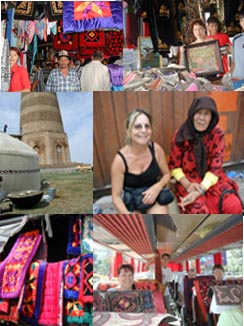|
Our
group bought many dolls, and felt rugs. Sharon bought woven belting for
her yurt.
Outside of the
buildings was much rubble. We were invited to see the painting by the
painter in another building. His work was interesting and expensive.
Back on the
bus at
10:30 and to the
State
Historical Museum (old Lenin Museum
with Lenin statue currently being relegated to a spot in the rear of the
museum).
On the right of Victory Square is a statue of a woman. In the museum a
Russian
couple painted the ceiling mural and it took them 10 months. The first
floor contains
larger than life bronze castings of Marx, Engels and Lenin with a
chronological
history of the rise of communism.
The next floor
contains history of Kyrgyzistan with archeological items including
a mummified corpse, carved stone grave markers, (unfortunately, all
descriptions
on the items were in Russian.), Decorations from Buddist temples and
Christian
crosses carved on stones were part of the chronology. There is an
extensive
display of costumes, embroidery, quilts, (including one for a horse
complete
with ear covers), rugs and wall hangings. Several pieces with exquisite
detail
were displayed behind glass. Many yurt belts were displayed. It recalled
how,
once they moved to the city, the Kirgize decorated their fences with the
same
patterns.
At 11:45 we
met across the street for an outdoor lunch at Orient International
Restaurant. We had Lavosh bread, soup, salad, potato salad, and a choice
of
lamb, chicken or fish as the main course and fruit - bananas, apricots,
grapes and apples.
At 1 PM we
boarded the bus for the 5-hour ride via Kurday Pass to Almaty.
Traveling NE we passed agriculture lands with corn, wheat and hay.
The outskirts of Bishkek contained many truck gardens and roadside
stands with a wide variety of vegetables, fruits, melons, eggs and huge
stacks
of canning jars. There are many small one and two room homes being built
on concrete slabs, constructed of brick, with metal roofs. Police are
commonly
seen standing along the road with batons which they use at random, waving
vehicles over for some sort of check. They stop our bus, only briefly.
No explanation! On our way again only to be stopped by cows crossing the
road.
At 2:00 we
were stopped by customs and the passports were collected and
checked by two officers. This is a duty free zone. There are bars across
the
road painted yellow and red. There are several that we go through before
crossing the bridge over the CHU River, a natural border between
Kyrgyzistan
and Kazakhstan. The baggage compartments are checked at one stop. Kuban
our guide takes passports inside to be stamped at the
Kazakhstan
entry.
This takes about 30 minutes to complete. We see men driving horses and
donkeys with wagons full of metal to Kyrgyzistan. The metal is being
trucked
and sold to China. There is a FUEL stop for the bus. The fuel stop was
at a
station with at least six grades of octane, ranging from 80-96. There is
even a
70, which is used for some of the old Russian cars. At the pumps are women
attendants.
We continue on
a bumpy, blacktop road that is tree lined.
There are stone covered waiting stations for people to wait for buses,
rolling
hillside, with grazing goats and sheep and a cemetery in a field on the
right side.
Rock out cropping, deer, goat, snow leopard, and eagle statues, and burned
fields fill our vision. Many buses coming toward us. Our driver keeps
the bus
traveling at 70 KM per hour. Kazakhstan is the ninth largest country in
the world.
It is five times the size of Texas. It has resources of gas, oil, gold,
coal and natural gas.
We have a
caravan bathroom stop. Oranges and snacks are passed out.
Meli show us pictures on the screen from her first tour three weeks prior
to ours.
There is a combine harvesting wheat in the field to the right. There is a
local time
change of one hour. It is now 6:15 PM. Mary has brought out the bubbles
and
we have a "Bouncing Bubble Bus". There is finally a smooth road for a
short
distance as they are working to build a new roadbed. We travel along side
on a dusty, bumpy road. It is time for entertainment with Mary singing
Chinese opera and Meli playing the Horsehead fiddle.
The bus stops
at a booth to pay the local tax before arriving into Almaty.
Almaty is a city of 1.5 million people. 40% of the population is
Russian.
Alta Matt meaning "father of apples." We stop for dinner before going to
Hotel Otrar. Larry has a memorable Warsteiner Beer for only $5.50
American Dollars!
Our waitress did not offer local beer. Our dinner was salad, soup and
main dish.
We arrive at the hotel, unpack ready for a good nights sleep.
Back to Melitour home
page
 next page next page
|
